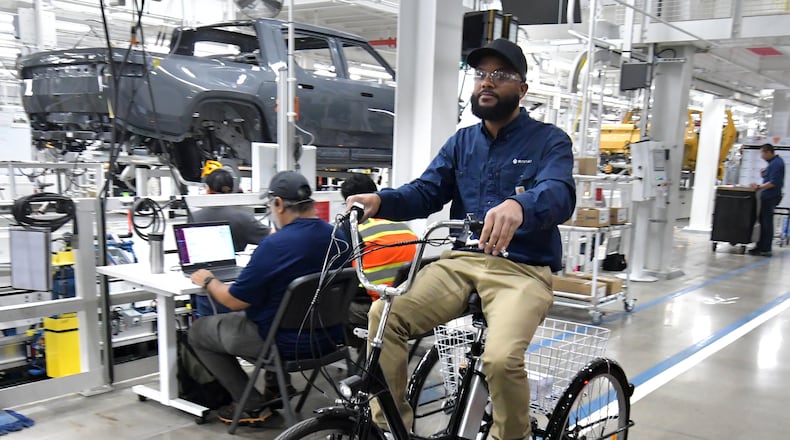Normal, Ill.--Sarah McManus has heard every joke that plays off her hometown’s name.
For 46 years, her family has run a gift shop in the center of the Illinois town, selling knickknacks, cooking supplies and gourmet popcorn. Lots of her merchandise pokes fun at Normal in a loving way — from “almost Normal” baseball caps to pun-filled postcards.
But Normal hasn’t lived up to its name over the past few years. Instead, it’s been thrust into the national spotlight after Rivian built its first electric vehicle manufacturing plant here.
“Rivian is all the buzz,” said McManus, whose store, The Garlic Press, sells a new coffee-flavored popcorn called “Rivian Buzz.”
Credit: Zachary Hansen
Credit: Zachary Hansen
The automaker plans to break ground in Georgia next month and build a $5 billion factory roughly four times the size of the Normal location. That will make the Peach State a linchpin in the startup company’s bid to become a leading maker of electric trucks and SUVs. The proposed 16-million-square-foot facility will be on a 2,000-acre rural plot about an hour east of Atlanta.
If Normal is a guide, big changes are coming here too.
Rivian’s factory has been widely credited with revitalizing the local economy of Normal and its sister city of Bloomington, bringing thousands of better-paying jobs. It’s also strained the area’s housing market, triggered an influx of young, tech-minded people from as far away as California, and made it harder for longer-established employers to find workers.
The impact could be even more dramatic in Georgia for factory neighbors. Not only will the plant be much larger, but Bloomington-Normal has more than 20 times the population of Social Circle and Rutledge, the towns closest to the Georgia site. And while the Normal factory is a repurposed building that was occupied by Mitsubishi for decades, the plant here is being built from scratch.
> Story continues below maps.
“It’s going to change the entire character of what is presently a rural and agricultural county,” said John Christy, an Atlanta attorney representing groups and residents opposing the Georgia factory. “It’s going to impact everything from noise, traffic, roads with cars, pollution — you name it.”
There also is more at stake for Georgia’s taxpayers, after the state gave Rivian a $1.5-billion incentive tax package, dwarfing the public money spent to lure the company to central Illinois.
Thus far, though, many residents and officials in Normal say their Rivian plant has brought more good than bad.
“If you want your kids to stay in the area because there are good-paying jobs, you can’t do better than Rivian,” said Normal Mayor Chris Koos.
From Car Insurance to Car Manufacturing
Bloomington-Normal may be surrounded by wind farms and cornfields, but the sister cities have historically been known for insurance and higher education. They’re the home of State Farm, Country Financial and Illinois State University.
Despite having access to three interstates and being a critical rail stop between St. Louis and Chicago, the cities never had much industrial development. Mitsubishi tried to change that dynamic in 1988, opening a 2-million-square-foot plant in Normal and creating thousands of jobs.
The Japanese automaker closed the factory due to lagging sales 27 years later, laying off more than 1,200 employees.
The closure was a dark cloud over the city. Jim Wilson of North Street Records, a fixture of Uptown Normal since the early 2000s, saw business fall.
“There were a few good customers who didn’t buy records for awhile,” the store’s co-owner said, “because you don’t buy records when you don’t have a job.”
Credit: Zachary Hansen
Credit: Zachary Hansen
Mitsubishi’s factory lay dormant for a few years and was close to being demolished. In 2017, Rivian scooped up the property for pennies on the dollar, and their plans only expanded once Amazon became one of the company’s top investors, placing an order for 100,000 electric delivery vans. Production began last year, and another 500,000 square feet of manufacturing space is under construction.
There is no guarantee the good times will last as long as they did with Mitsubishi. Rivian made a splash last year when it went public, but its stock has since plunged amid growing competition and manufacturing problems. The California-based EV maker said last month it was laying off 6% of its staff after cutting its 2022 production goal in half.
Credit: RON JOHNSON
Credit: RON JOHNSON
Still, Ajay Samant, the dean of Illinois State University’s State Farm School of Business, said Rivian’s plant started a “snowball effect” of industrial investment around Normal. Auto part suppliers and other factories, including one making Ferrero chocolate, came to town.
Patrick Hoban, the economic development director for McLean County and Bloomington-Normal, said he frequently talks with business investors from around the globe, many of whom probably couldn’t point out Illinois on a map, but they know of the work being done in his area.
“When talking about Illinois, they know Michael Jordan, Chicago and Rivian,” Hoban said.
‘Industrial chic’
Stacy Cameron worked for Mitsubishi the full 27 years they operated the Normal factory and was among the people laid off when the plant closed in 2015.
Cameron, 60, still walks the floors at the factory but now as a Rivian employee. And it’s very different.
“I get cramps in my legs trying to walk through this plant now,” said the quality control inspector, laughing. “It’s so big.”
Credit: Rivian
Credit: Rivian
The entire interior of the factory was painted white. For every one LED ceiling light Mitsubishi installed, Rivian added three more, giving it the feeling of a brightly-lit Apple store. More than 50,000 plants are spread throughout the building, its lobby and meeting rooms and cubicle spaces.
“It’s industrial chic,” Cameron said.
Credit: RON JOHNSON
Credit: RON JOHNSON
Electric vehicle production presents unique challenges, said Gene Liao, a professor at Wayne State University’s Center for Automotive Research.
Battery fires are a particular risk in EV factories. When one battery cell combusts, it can spark a chain reaction, which is especially dangerous when multiple cells are fused together to build an engine. Each Rivian vehicle has at least 7776 cylindrical cells.
Since the Normal plant opened last summer, three battery fires have taken place, requiring evacuations and fire department responses. No one has been hurt in any of the incidents.
Rivian, which aims to deliver 25,000 vehicles this year in Normal, plans to start production at the Georgia factory in 2024. The Georgia location could eventually produce up to 400,000 vehicles annually, a gigantic step in Rivian’s goal to sell 1 million vehicles by 2030.
Tim Fallon, Rivian’s vice president of manufacturing, said the Georgia plant should be able to ramp up production at a faster rate since it’ll be designed from the ground up for Rivian’s vehicles rather than being retrofitted space.
“We’ll do it different in Georgia,” he said.
Credit: RON JOHNSON
Credit: RON JOHNSON
’We literally ran out of homes’
Rivian has quickly grown into Bloomington-Normal’s second-largest employer, lagging only behind State Farm.
The factory employs nearly 6,000 workers, and local leaders estimate that more than 3,000 ancillary jobs were created to support the rush of new residents. The influx has pushed the region’s housing market to its limit.
“We were not ready,” Hoban said. “We literally ran out of homes.”
According to a recent report by the Bloomington-Normal Economic Development council, the county is projected to have the largest population increase in Illinois outside of the Chicago metro area. The analysis found the region needs more than 4,300 new housing units to meet the demand.
Olivia Cantu, an assistant manager at Class Act Realty in Normal, said her agency only had four residential listings in the entire city in late July and most properties immediately get scooped up by Rivian employees.
“They’re pretty much grabbing anything they can,” Cantu said.
Koos, the town’s mayor, said the city is nearly void of multifamily developments aside from Illinois State’s student dorms. Subdivisions are expanding, but not quickly enough.
“Multifamily is a new concept,” Koos said. “We’re scrambling to find some people to understand what the market is and build the right kind of housing.”
Single-family homes are the standard in the rural Georgia communities around Rivian’s project site, but a few surrounding cities have apartment projects in the works. Marc Beechuk, the planning director for Covington, said four projects are expected to add roughly 1,600 multifamily units to the city, which he said is a result of the economic investment in the area.
The Joint Development Authority of Jasper, Morgan, Newton and Walton counties, which has been heavily involved in bringing Rivian to Georgia, said in a statement that it doesn’t expect housing to be a problem. It cites the proximity of metro Atlanta and the vast amount of land in their four-county area.
Metro Atlanta’s housing market has been one of the hottest in the country. Median prices have climbed about 28% over the past two years, according to Realtor.com, as demand outstrips supply.
Rivian’s Georgia employees will be a mix of transplants and locals. In Bloomington-Normal, the unemployment rate dipped to 3.6% in June, which is about one percentage point lower than the statewide average, according to the Bureau of Labor Statistics.
A Rivian spokeswoman declined to provide demographic or salary information for current employees, but the company’s incentive package with Georgia said the average salary should be $56,000 at the new factory. Rivian has said it will employ as many as 7,500 people at the Georgia plant.
Cantu remembers Rivian’s hiring spree when it first came to Normal and how other local employers struggled to keep up with the company’s higher wages.
“Why wouldn’t you work in an assembly line making double what you’re making doing a customer service job?” she said, remembering back to her time as a Walmart store manager.
Credit: RON JOHNSON
Credit: RON JOHNSON
Others saw their businesses saved by the number of new customers. Migidi Tembo, the general manager of the Marriott Hotel in Bloomington-Normal, said about 75% of his business was thanks to Rivian during the summer of 2020. Even now, nearly half of his hotel guests are connected to Rivian.
“Everybody sees Rivian trucks driving around,” he said. “It’s like having an industrial revolution happening in my own backyard. I don’t know where the Midwest Silicon Valley is, but maybe this is it?”
A note of disclosure
Cox Enterprises, owner of the AJC, owns about a 4% stake in Rivian and supplies services to it. Sandy Schwartz, a Cox executive who oversees the AJC, is on Rivian’s board of directors and holds stock personally. He does not take part in the AJC’s coverage of Rivian.
About the Author
Keep Reading
The Latest
Featured










